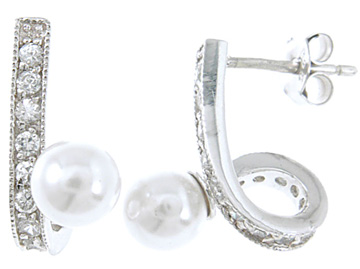| opal jewelry |
 |
| To view opal jewelry click image. |
Opal is a gem of water, born in the desert. Opal jewelry has been treasured
throughout history around the world. Opal was much loved and
valued highly by the Romans, who called it opalus. Opal is the birthstone for October. A woman lucky enough to have October birthday receiving opal jewelry as a gift, as it is jewelry that everybody wants in their jewelry box. One myth is the belief that opal jewelry is bad luck for those who are not born in October. The tradition of birthstones is imbedded in our modern culture. Opal jewelry is as popular as it ever was, and you can choose from an endless selection of items adorned with these special gems. Opal is famous for its flashes of fire or "play of color" and is the most popular of all phenomenal gemstones. Multicolored flashes of light that opal emits gives it a truly beautiful look. Opal comes in a few different varieties: the finest black
opal has a blue, gray or black body color with vibrant flashes
of color; white opal is light in body color with play of color;
boulder opal is mixed with rock matrix; fire opal is translucent
orange, yellow or red. In today's world of constantly evolving technology, the passion that opal jewelry masters demonstrate for the quality of their workmanship is a powerful human resource. Opal jewelry gift is one of the tangible ways to show that certain someone how you love and appreciate. Make her day with a gift of beautiful opal jewelry. Opal was very treasured and was called eye stone, due to a widespread belief that it was beneficial to eyesight. Women wore opal jewelry to protect their hair from losing its color. Some thought the opal's effect on sight could render the wearer invisible. Within each opal variety, the brilliance of the play of color is the most important value factor. The strength of the colors seen in opal depends on the background body color and the transparency of the stone. Opal is one of the few gemstones that are sedimentary in origin. Opal still contains 6 to 10 percent water, a remnant of the ancient sea. The rarity and natural beauty of gemstones have intrigued and inspired us for thousands of years. Virtually every culture throughout history has valued gemstones as objects of personal adornment and as symbols of wealth and status. |
